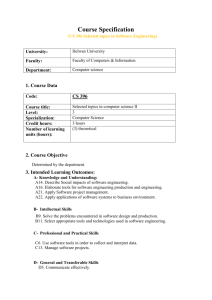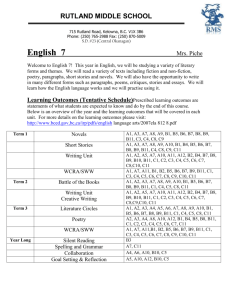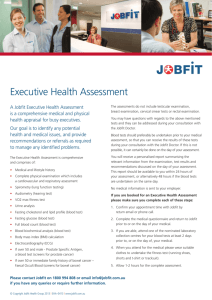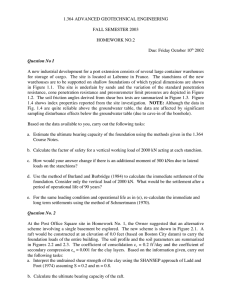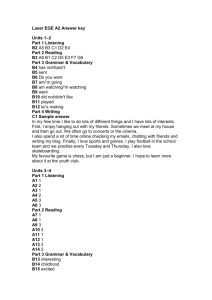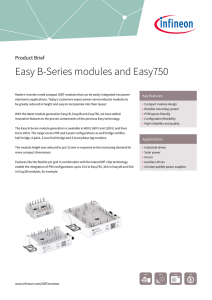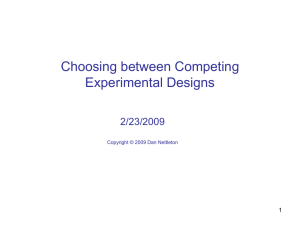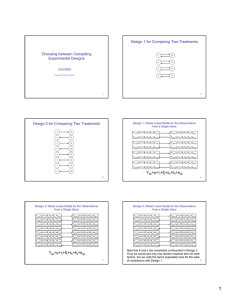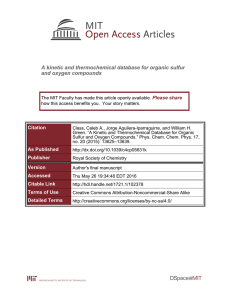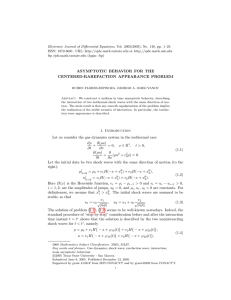Information systems
advertisement
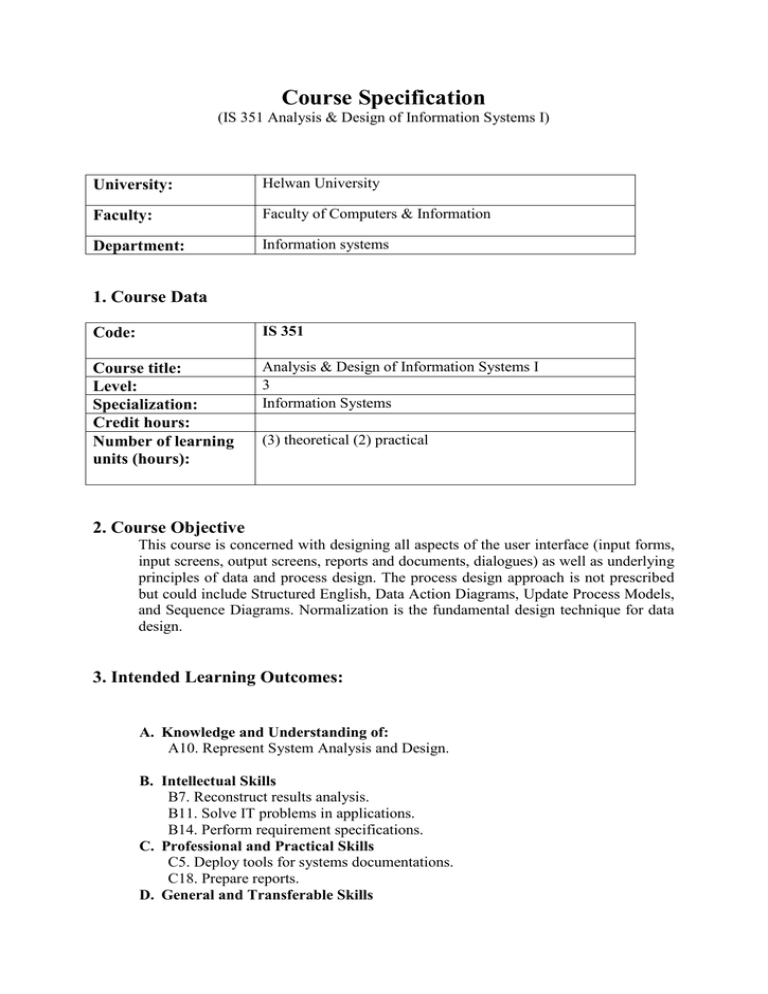
Course Specification (IS 351 Analysis & Design of Information Systems I) University: Helwan University Faculty: Faculty of Computers & Information Department: Information systems 1. Course Data Code: IS 351 Course title: Level: Specialization: Credit hours: Number of learning units (hours): Analysis & Design of Information Systems I 3 Information Systems (3) theoretical (2) practical 2. Course Objective This course is concerned with designing all aspects of the user interface (input forms, input screens, output screens, reports and documents, dialogues) as well as underlying principles of data and process design. The process design approach is not prescribed but could include Structured English, Data Action Diagrams, Update Process Models, and Sequence Diagrams. Normalization is the fundamental design technique for data design. 3. Intended Learning Outcomes: A. Knowledge and Understanding of: A10. Represent System Analysis and Design. B. Intellectual Skills B7. Reconstruct results analysis. B11. Solve IT problems in applications. B14. Perform requirement specifications. C. Professional and Practical Skills C5. Deploy tools for systems documentations. C18. Prepare reports. D. General and Transferable Skills D5. Practice Creative thinking techniques. D13. Use Designing skills to solve problems effectively. 4. Course contents Topic Introduction Design & Implementation in the lifecycle Interpreting the models of analysis Design approach Design objectives and constraints Design architecture Input / Output Design Input and output design Form and document design Selection of appropriate input and data capture solutions Output technologies Selection of appropriate output technologies Interface Design Design of input & output screens Design of human/computer interaction Usability and style guides Modeling / prototyping the interface Data Design (normalization) Notation and conventions of relational data analysis Progressive normalization of selected inputs and outputs from un-normalized format to third normal form Rationalizing results Third Normal Form data model Process Design & Specification Detailed definition of write (read and update) processes Detailed definition of read-only processes Controls and Security Physical security Logical security (passwords, access control) Risk assessment Backup and recovery procedures Audit trails Contingency planning Legislative controls Ethical issues No. of hours Lecture Tutorial/ Practical 3 1 1 3 1 1 3 1 1 6 2 2 6 2 2 6 2 2 Physical Design Physical data design Design of codes and keys Physical process design Physical process deign principles (e.g. cohesion and coupling) Design patterns Interface and sub-system design Principles of re-factoring Round-trip engineering Testing within the chosen lifecycle Test cases from design models Design and code inspection Unit testing Integration testing in the small (link testing) System testing Integration testing in the large User acceptance testing Requirements traceability Methods of implementation Implementation planning and preparation Changeover methods Handover procedures Training Analyzing training needs Methods of training delivery Evaluating training Post implementation Post implementation & post project reviews Benefits realization Types of maintenance Change control Build and release strategy 6 2 2 3 1 1 3 1 1 3 1 1 3 1 1 Mapping contents to ILOs Topic Intended Learning Outcomes (ILOs) Knowledge and Intellectual Professional understanding Skills and practical skills Introduction A10 B7 C5 Input / Output Design B11 Interface Design A10 B14 Data Design B14 C18 Process Design & A10 C5 Specification Controls and Security Physical Design Testing within the chosen lifecycle Methods of Training B11,B7 B11 A10 General and Transferable skills D5 D13 D5 C18 D5,D13 B11 Post implementation B14 C18 5. Teaching and Learning Methods Lectures Exercises Case Studies Lab Work 6. Teaching and Learning Methods for students with limited capability Using data show e-learning management tools 7. Students Evaluation a) Used Methods Written Exams: to assess Concepts related to system development tools Project: to assess understanding of system development tools Presentation: to assess workgroup collaboration and communication skills. b) Time Assessment 1… Mid-Term Examination Assessment 2 … Practical Examination Assessment 3… Semester Work and Project Week 8 Week 15 Week 4, 8, 12, 14 c) Grades Distribution Mid-Term Examination Final-term Examination Practical Examination Semester Work and Project Total 10% 50% 20% 20% 100% List of Books and References a) Notes Course Notes b) Mandatory Books Whitten, Jeffery and L., Lonnie D. Bentley, Kevin C. Dittman . Systems analysis and design methods. Boston : McGraw-Hill Irwin, c2004 . 6th ed. Kirikova, Marite et. al,. Information Systems Development: Advances in Methodologies, Components and Management Springer;1 edition (February 28, 2003) c) Suggested Books Information Systems Development and Data Modeling: Conceptual and Philosophical Foundations (Cambridge Tracts in Theoretical Computer Science) by Rudy Hirschheim, Heinz K. Klein, and Kalle Lyytinen (Hardcover - Oct 27, 1995) d) Other publications http://goliath.ecnext.com/coms2/summary_0199-1955991_ITM http://www.isbn.nu/toc/0306476983 Course Coordinator: Dr. Ayman Khedr Chairman of the Department: Prof. Dr. Yehia Helmy
